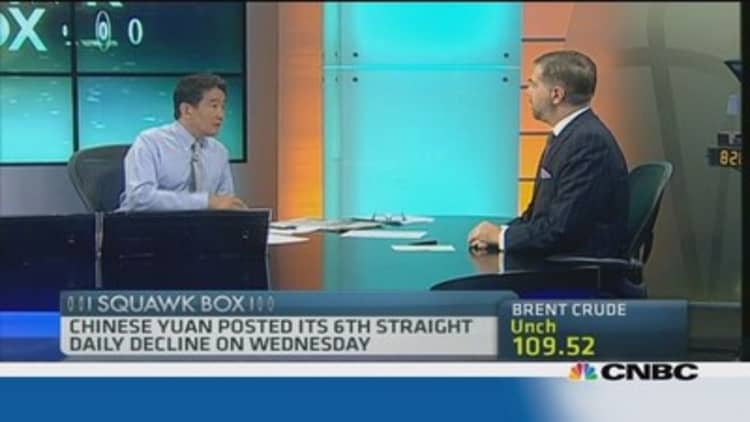The tightly controlled will eventually supersede the dollar as the top international reserve currency, according to a new poll of institutional investors.
The survey of 200 institutional investors - 100 headquartered in mainland China and 100 outside of it - published by State Street and the Economist Intelligence Unit on Thursday found 53 percent of investors think the renminbi will surpass the U.S. dollar as the world's major reserve currency.
Optimism was higher within China, where 62 percent said they saw a redback world on the horizon, compared with 43 percent outside China.
"As China's economic influence grows, the global importance of the renminbi will become magnified. Indeed, while for decades it has been a 'greenback world', dominated by the U.S. dollar as the world's primary reserve currency, many think a 'redback world', in which the renminbi enjoys premier status, is increasingly a possibility," the report accompanying the survey said.
(Read more: Yuan takesanother step forward as a world currency)
This view was shared by European Central Bank Executive Board member Yves Mersch, who said on Wednesday that China's yuan is gaining importance in international trade and investment and might ultimately challenge the U.S. dollar.
However, skeptics of yuan internationalization argued that the renminbi will never be liquid enough across all asset classes to serve as a viable reserve currency, and that people will not trust the renminbi as a store of value.
Despite being a closely-managed currency, the renminbi's global clout has been rising steadily. By the end of 2013, the renminbi had become the second most used trade financing currency and ninth most used currency for payments globally.
(Read more: Yuan overtakeseuro as 2nd most used currency in trade finance)
Recent moves in the yuan have triggered speculation that the People's Bank of China is getting ready to widen its trading band - which would be a step towards liberalizing the Chinese currency. The yuan is currently allowed to rise or fall by 1 percent in either direction from a level fixed against the dollar each day by the country's central bank.
Ultimately, a greater role for the yuan would require China to liberalize its financial policies, including decreasing exchange-rate intervention, liberalizing interest rates and relaxing restrictions on capital flows.

Two-thirds of the respondents of the survey expect Beijing to complete its financial liberalization within ten years, with a majority expecting major reforms within five.
(Read more: Is China gettingready to widen the yuan's band?)
Financial liberalization in the mainland began in earnest after 2009, with the government's decision to allow cross-border trade settlement in renminbi, ease the process of listing offshore bonds and introduce the renminbi qualified institutional investors (RQFII) program.
The reforms, however, are still limited in scope, with strict quotas for how much currency can move across the border.
Last year, the government launched the Shanghai free-trade zone as a testing ground for financial reforms, including full yuan convertibility.
—By CNBC's Ansuya Harjani. Follow her on Twitter @Ansuya_H


